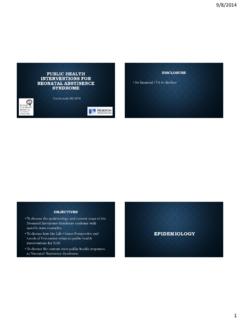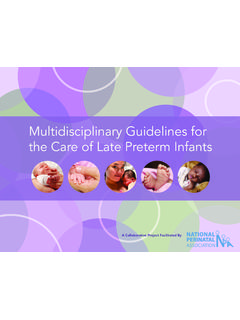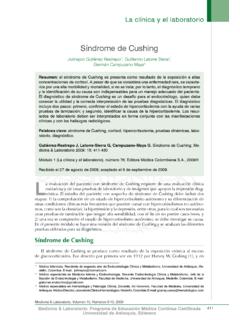Transcription of Challenges of Foster Parents who Care for Infants …
1 Challenges of Foster Parents who Care for Infants with neonatal abstinence syndrome All Health Care Providers are required by law to make a referral to the Department of Children s Services (DCS) Child Abuse Hotline whenever a newborn tests positive for any type of drug exposure. DCS classifies ANY infant born after being exposed to drugs in the womb as a Drug Exposed infant . Babies that have been diagnosed with NAS fall into the DCS Drug Exposed infant category. But not all babies that are classified as Drug Exposed Infants by DCS are diagnosed with NAS. Parent/Caregiver Education of NAS Symptoms Signs & Symptoms What Is This? What Parents & Caregivers Can Do Excessive high pitched cry Continuous high pitched cry Drug withdrawal can be very uncomfortable sometimes painful & make your baby irritable.
2 Help soothe baby by swaddling, holding baby close or offering a pacifier. Sleeping less than 1 hour t o 3 h o u r s Withdrawal symptoms can make your baby uncomfortable making it difficult for baby to sleep. I f baby wakes up, offer a pacifier to help baby go back to sleep. If your baby is asleep when you get to the bedside, let baby sleep until baby wakes up to eat. During a feeding is the best time to hold your baby. Moro Reflex Moro reflex is a normal reflex for newborn babies. Babies experiencing withdrawal have sensitive central nervous systems that can cause extra abnormal movements (jitters and/or jerk s) after the Moro reflex. Approach your baby quietly. Don't speak loudly a n d use gentle, firm pressure when touching your baby. Do not stroke your baby. Tremors A few tremors are normal for a baby to have.
3 Babies experiencing withdrawal may have more tremor s due to their sensitive central nervous systems. Keep your baby swaddled. If your baby is having tremors, gently but firmly hold their arms and legs close to their bodies. Sometimes this w ill help stop the tremors. Always use a gentle but firm pressure when touching your baby. Increased Muscle Tone Withdrawal can make a baby stiff and hard to bend the arms and legs. This will go away after baby goes home. Be gentle when changing diapers. A physical therapist ma y work with you and you r baby to help baby relax. Excoriation Withdrawing babies are irritable and will rub their chins, knees, elbows, nose and toes against blanket s, sheets or clothing. Keep your baby swaddled. Sometimes nurses will p l ace clear dressing on the knees to protect them.
4 You can place mitten s on your baby's hands to prevent scratching face. Myoclonic jerks (twitching or jerking of arms and/or legs) Babies experiencing withdrawals can have very sensitive central nervous systems which can be easily stimulated by sound and/or touch. Approach your baby quietly. Do not wake baby up unless it is time to eat. Speak softly to your baby and use a firm touch. Do not stroke or pat your baby. Generalized Convulsions/seizures This is a rare but very serious symptom of drug withdrawal. I f your baby has seizures; medication will be given to help control them. You will have to learn how to give this medicine to your baby. Sweating Babies usually do not sweat. Babies who are withdrawing have an increased metabolism which will sometimes cause them to sweat. Do not overheat your baby.
5 Keep baby in light clothing or just a diaper while baby is swaddled. Increased temperature (hyperthermia) Just like with sweating, your baby's increased metabolism may cause your baby to run a fever. Your baby may get Tylenol to help decrease temperature. Do not overheat your baby. Keep baby swaddled in a light blanket. Frequent yawning Babies normally do not yawn very much but take note if the baby yawns more than 3 times within a short period of time. This w ill improve as the withdrawal symptoms subside. Mottling Mottling is a discoloration of the skin especially on baby's chest, trunk, arms and legs. This can be normal for babies in withdrawal and will go away. Nasal stuffiness Babies are nose breathers. I t can be frustrating for babies experiencing withdrawal to get stuffed up. This does not mean they are sick; it is a symptom of withdrawal.
6 Frequent suctioning of the nose can make the stuffiness worse. Do not suction baby's nose un less there is drainage. Sneezing Babies do not normally sneeze. If a Baby is withdrawing and sneezes more than 3 times during a set period of time; it does not mean your baby is sick. Sneezing is a symptom of withdrawal Sneezing eventually goes away as symptoms of withdrawal subside. Let your nurse know if your baby sneezes. Nasal flaring It may be harder for your baby to breathe normally while they are withdrawing. One of the signs of this is flaring their nostrils when they breathe. Holding baby upright may help breathe normally while they are baby breathe easier. Make sure the withdrawing. One of the signs of head of the crib is elevated when your this is flaring their nostrils when they baby is lying in the crib.
7 Holding baby upright may help baby breathe easier. Make sure the head of the crib is elevated when your baby is lying in the crib. Respiratory rate Breathing fast is another symptom of drug withdrawal. Sometimes you can see your baby's ribs when they breathe; these are called retractions. Keep you r baby calm and hold your baby upright. Keeping the head of the crib elevated can also help. Excessive sucking Sometimes babies will act frantic when they are experiencing withdrawal. They will suck excessively on their pacifier, their hands or anything else that comes near their mouth. Try and keep your baby calm, especially before a feeding. Swaddle in a blanket and offer a pacifier. Poor feeding Even when your baby sucks well on a pacifier, it may be difficult to coordinate sucking on a bottle.
8 Babies experiencing withdrawal are easily over stimulated which interferes with coordination while bottle feeding. Do not rock or stimulate your baby while bottle feeding. Keep swaddled during the feeding. Help pace you r baby while you feed. Your nurse and the speech therapist can give you suggestions on how to help baby eat. Regurgitation Projectile vomiting I t is normal for a baby to have a wet burp or spit up a little during or after a feeding. Babies who are experiencing withdrawal often spit up more than is normal. It is not normal for a baby to vomit excessively during or after a feeding. This is called feeding intolerance. Your baby will be on a special formula while in the nursery which should help with feeding intolerance. Pacing your baby while bottle feeding may also help. Your baby may also be on other medications to help relieve symptoms.
9 You can learn how to give these medication s while you are with your baby. Loose stools Watery stools Babies experiencing withdrawal will sometimes get upset stomachs and stomach cramps. This can cause loose, diarrhea like stools. These loose stools can cause a red, irritated bottom. Be very gentle when changing your baby's diaper. Use sterile water wipes and put skin barrier on the bottom for protection. Challenges of Foster Parents who Care for Infants with neonatal abstinence syndrome Revised: August 2014 Tennessee Department of Children s Services Page 1 NOTES: Challenges of Foster Parents who Care for Infants with neonatal abstinence syndrome Revised: August 2014 Tennessee Department of Children s Services Page 2 Challenges of Foster Parents who Care for Infants with neonatal abstinence syndrome Revised: August 2014 Tennessee Department of Children s Services Page 3 NOTES.
10 Challenges of Foster Parents who Care for Infants with neonatal abstinence syndrome Revised: August 2014 Tennessee Department of Children s Services Page 4 NOTES: Challenges of Foster Parents who Care for Infants with neonatal abstinence syndrome Revised: August 2014 Tennessee Department of Children s Services Page 5 Challenges of Foster Parents who Care for Infants with neonatal abstinence syndrome Revised: August 2014 Tennessee Department of Children s Services Page 6 NOTES: Challenges of Foster Parents who Care for Infants with neonatal abstinence syndrome Revised: August 2014 Tennessee Department of Children s Services Page 7 NOTES: Challenges of Foster Parents who Care for Infants with neonatal abstinence syndrome Revised: August 2014 Tennessee Department of Children s Services Page 8 Resource Guide: WBIR TV A Mom s Story.








